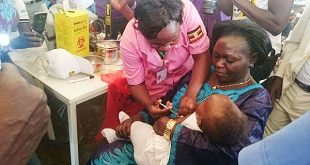
ABUJA | Xinhua | Nigerian authorities on Thursday alleged massive looting and vandalism of public and private buildings, and the blockade of highways, as protesters turned out in their thousands across the country to express their grievances over the current economic hardships.
Some bonfires were seen set up by protesters in different parts of the country on the first day of the planned 10-day protests, which were intended to peacefully call on the government to address the economic hardships amid the serious cost-of-living crisis in Africa’s most populous country.
The demonstrations turned violent in some major cities, including Abuja, Kano, Kaduna, and Gombe, prompting the police to beef up security.
Addressing the media late Thursday, Inspector General of Police Kayode Egbetokun issued “a red alert” to all police commands and units across the country, and alleged “destruction of private businesses.”
“We have received reports of unprovoked attacks on security personnel, and police stations,” Egetokun said, adding several people were seriously injured during the protests.
He said destructions were carried out in a total of eight out of Nigeria’s 36 states on the first day of protests, questioning the real motive of the protesters.
In Abuja, the demonstration turned chaotic as the police dispersed the crowd marching toward Eagle Square, adjacent to the Three Arms Zone, where the Presidential Villa, National Assembly, and the Supreme Court are located. Tear gas canisters were fired by the police to disperse crowds in several states.
A small skirmish between protesters and police in the northwestern state of Kaduna turned violent as demonstrators allegedly marched toward the Government House to “burn the building,” Mansir Hassan, police spokesman in the state, told the media. He said a police personnel was injured during the scuffle.
A local government office in the northeastern state of Yobe was torched by violent protesters, who also razed several government vehicles during the demonstration, police said.
In the northwestern state of Kano, the Digital Industrial Park of the Nigerian Communications Commission office was among the public properties that were vandalized, Bosun Tijani, the minister of Communications, Innovation, and Digital Economy, said in a statement posted on social media platform X.
Tijani lamented the vandalism of the facility, designed to be a tech hub in the northern part of the country, while alleging that the demonstrators also carted away computers, office furniture, air conditioners, and metal signboards, to mention a few.
Governor of Kano State Abba Yusuf imposed a 24-hour curfew following “the massive looting,” noting that hoodlums armed with various weapons hijacked the protests. He said the protesters took to the streets in parts of the metropolis and attacked shops and offices, including the Digital Industrial Park.
Deji Adeyanju, the convener of the Concerned Nigerians, a group participating in the protests, said that concerted efforts were made in collaboration with security agencies, especially the police, to ensure a peaceful protest.
Adeyanju, who also serves as one of the lawyers offering pro bono services to the protesters, alleged that some “pro-government demonstrators” held a counter-protest to frustrate the “peaceful nature” of the demonstrations and instigate violence in Abuja.
In a bid to avoid “undesirable outcomes” of the nationwide protests, the Nigerian government had earlier appealed for calm while calling on the youth to shelve the demonstrations and make way for continued robust dialogue to address their grievances.
Minister of Information and National Orientation Mohammed Idris told the media early this week that while the government is not opposed to peaceful protests, it appealed to the youth first to shelve the demonstration, “which might be hijacked by unscrupulous elements, and turn violent.”
Last year, the Nigerian government removed the subsidies on petrol or gasoline and floated the local currency in the wake of ongoing economic and fiscal reforms in the country. The inflation rate in Nigeria rose to 34.19 percent in June amid the worst cost of living crisis in the West African country. ■
 The Independent Uganda: You get the Truth we Pay the Price
The Independent Uganda: You get the Truth we Pay the Price


